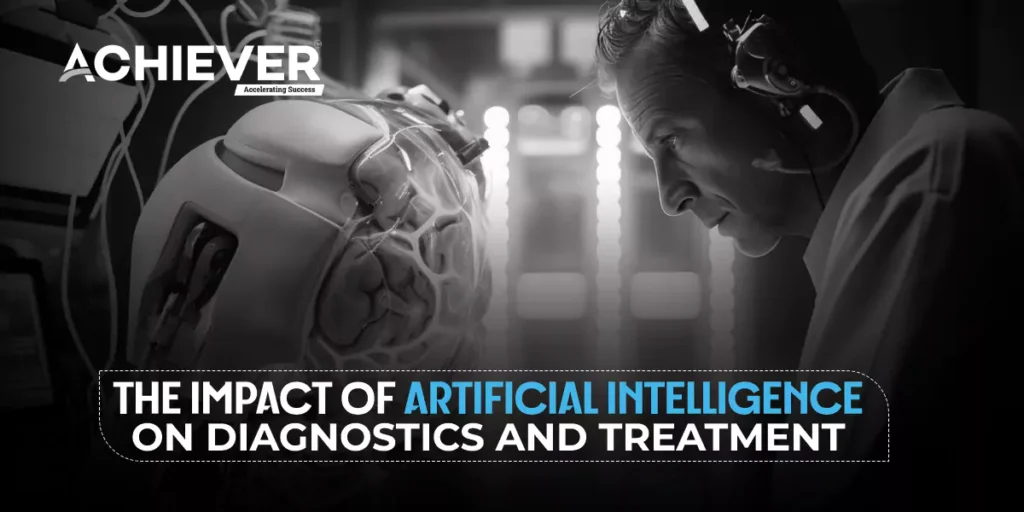In recent years, the integration of artificial intelligence (AI) into healthcare has emerged as a transformative force, reshaping the landscape of diagnostics and treatment. From improving accuracy in disease detection to personalizing treatment plans, AI technologies are paving the way for enhanced patient care. This article explores the profound impact of AI on diagnostics and treatment, highlighting the benefits, challenges, and future prospects of this innovative approach.
The Role of AI in Diagnostics
AI technologies, particularly machine learning and deep learning, have shown remarkable potential in the realm of diagnostics. These algorithms can analyze vast amounts of medical data, including imaging studies, laboratory results, and electronic health records, to identify patterns and make predictions with unprecedented speed and accuracy.
- Medical Imaging Analysis
One of the most significant applications of AI in diagnostics is in medical imaging. AI-powered tools can assist radiologists in interpreting X-rays, CT scans, and MRIs by identifying anomalies that may be missed by the human eye. For instance, studies have demonstrated that AI algorithms can detect cancers, fractures, and other conditions with accuracy comparable to or even exceeding that of human experts. This capability not only enhances diagnostic accuracy but also reduces the time required for analysis, enabling faster decision-making.
- Predictive Analytics
AI can also be used for predictive analytics, enabling healthcare providers to identify patients at risk of developing certain conditions. By analyzing historical data and recognizing risk factors, AI algorithms can predict the likelihood of diseases such as diabetes, cardiovascular issues, and more. This proactive approach allows for early intervention and preventive measures, ultimately improving patient outcomes.
- Genomic Data Analysis
With the rise of precision medicine, AI’s ability to analyze genomic data has become increasingly important. AI can process complex genomic information to identify genetic mutations associated with specific diseases, helping clinicians tailor treatment plans based on a patient’s unique genetic profile. This personalized approach enhances the effectiveness of treatments while minimizing adverse effects.
Enhancing Treatment Plans with AI
AI is not only revolutionizing diagnostics but also transforming treatment protocols. By leveraging data-driven insights, healthcare providers can create more effective, individualized treatment plans for patients.
- Personalized Medicine
The concept of personalized medicine involves tailoring medical treatment to the individual characteristics of each patient. AI facilitates this by analyzing patient data, including genetic, environmental, and lifestyle factors, to recommend the most suitable therapies. For example, in oncology, AI can help identify the best chemotherapy regimen based on a patient’s specific tumor characteristics, enhancing treatment effectiveness and minimizing side effects.
- Decision Support Systems
AI-driven clinical decision support systems (CDSS) assist healthcare professionals in making informed decisions regarding patient care. These systems analyze patient data and provide evidence-based recommendations for treatment options, medication dosages, and potential drug interactions. By leveraging AI, clinicians can reduce the likelihood of errors and enhance patient safety.
- Robotic Surgery
AI technologies are increasingly being integrated into surgical procedures, leading to improved outcomes and reduced recovery times. Robotic surgical systems, powered by AI, can perform minimally invasive procedures with precision, allowing for faster recovery and less postoperative pain. Surgeons can utilize AI to enhance their skills and make more informed decisions during surgery, ultimately improving patient outcomes.
Challenges and Ethical Considerations
Despite the numerous advantages of AI in healthcare, several challenges and ethical considerations must be addressed.
- Data Privacy and Security
The use of AI in healthcare involves processing vast amounts of sensitive patient data, raising concerns about data privacy and security. Ensuring compliance with regulations such as the Health Insurance Portability and Accountability Act (HIPAA) is crucial to protect patient information and maintain trust in AI systems.
- Bias in AI Algorithms
AI algorithms are only as good as the data they are trained on. If the training data is biased or unrepresentative of diverse populations, the AI system may produce skewed results. It is essential to ensure that AI models are trained on comprehensive datasets to minimize bias and ensure equitable healthcare for all patients.
- The Human Element
While AI can enhance diagnostics and treatment, it cannot replace the human element of healthcare. Patients value empathy, understanding, and personal connection, which are essential components of effective care. Striking a balance between technology and the human touch is vital to ensure a holistic approach to patient care.
Future Prospects
The future of AI in diagnostics and treatment is promising. As technology continues to evolve, we can expect several advancements:
- Integration with Electronic Health Records (EHR)
AI systems will increasingly be integrated with EHR platforms, allowing for seamless data sharing and real-time analysis. This integration will enable healthcare providers to access AI-driven insights at the point of care, enhancing decision-making.
- Remote Monitoring and Telehealth
The rise of remote patient monitoring and telehealth solutions, powered by AI, will facilitate ongoing patient engagement and timely interventions. AI algorithms can analyze data from wearable devices to identify health trends and alert healthcare providers when intervention is necessary.
- Enhanced Research and Drug Development
AI will play a pivotal role in accelerating medical research and drug development. By analyzing vast datasets, AI can identify potential drug candidates, predict their efficacy, and streamline clinical trials, ultimately bringing new treatments to market faster.




